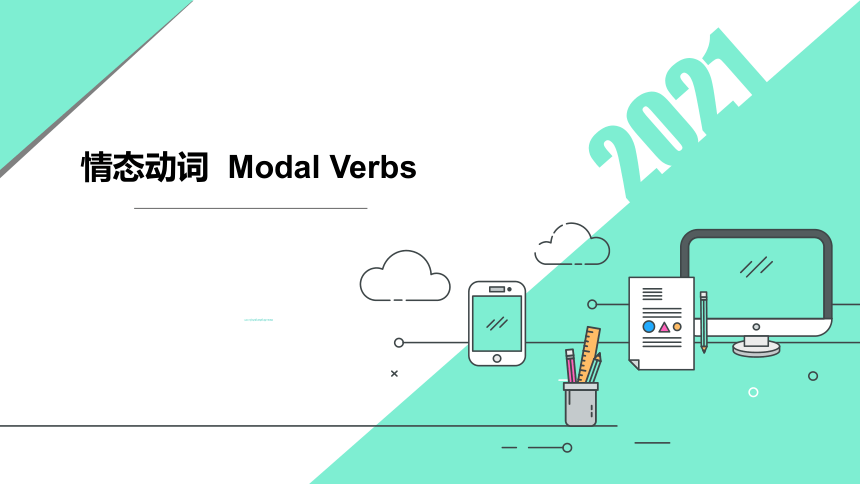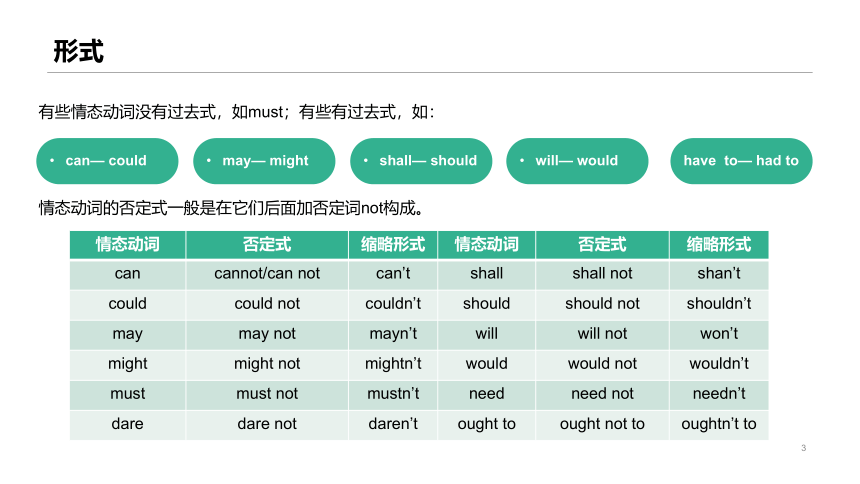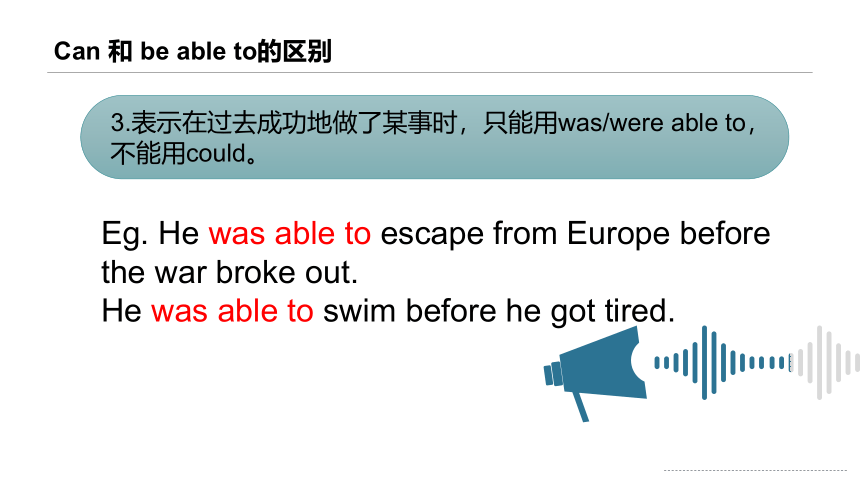人教版(新课程标准)必修三Unit 1 Festivals around the world 情态动词课件(13张ppt)
文档属性
| 名称 | 人教版(新课程标准)必修三Unit 1 Festivals around the world 情态动词课件(13张ppt) |

|
|
| 格式 | zip | ||
| 文件大小 | 266.1KB | ||
| 资源类型 | 教案 | ||
| 版本资源 | 人教版(新课程标准) | ||
| 科目 | 英语 | ||
| 更新时间 | 2021-12-12 08:40:04 | ||
图片预览







文档简介
(共14张PPT)
情态动词 Modal Verbs
www.
2021
定义
2
情态动词表示说话人对某一动作或状态的态度,认为“可能”、“应当”“必要”等等,但本身词义不完全,不能单独做谓语动词,必须和不带to的不定式(即动词原形)连用。情态动词没有人称和数的变化。
可作情态动词也可当实义动词:need,dare/dared
形式
3
can— could
有些情态动词没有过去式,如must;有些有过去式,如:
may— might
shall— should
will— would
have to— had to
情态动词的否定式一般是在它们后面加否定词not构成。
情态动词 否定式 缩略形式 情态动词 否定式 缩略形式
can cannot/can not can’t shall shall not shan’t
could could not couldn’t should should not shouldn’t
may may not mayn’t will will not won’t
might might not mightn’t would would not wouldn’t
must must not mustn’t need need not needn’t
dare dare not daren’t ought to ought not to oughtn’t to
Some of us can use the computer now, but we couldn’t ten years ago.
Can, could 的用法
4
1.can, could表示“能力”,翻译成“能”
2.can.could 表示“推测”,翻译成“可能”
3.can表示“有时会”还表示:“允许”
Kunming can be very cold in summer.
I thought the story could not be true.
4.Could可用于委婉的请求及建议,回答用can
Could you help me? yes, I can.
can和be able to 的区别
5
Eg. She was able to sing the song in English.
This machine can make you feel comfortable.
1.can,be able to 都用来表示“能力”;
be able to 的主语只能是人;can的主语可以是人,也可以是物
2.can只用于现在时和过去时(could),be able to 可以用于各种时态。
Eg. We’ll be able to finish the work soon.
I haven’t been able to see the film.
Can 和 be able to的区别
3.表示在过去成功地做了某事时,只能用was/were able to,不能用could。
Eg. He was able to escape from Europe before the war broke out.
He was able to swim before he got tired.
Might表示语气更加不肯定
may/might 的用法
7
1.
01
02
may表示许可,翻译成:可以
May I open the door?
We may keep the book for two weeks.
may用于祈使句,表示祝愿
May you succeed!
May you have a nice trip!
03
may/might 表示可能性推测时,翻译成:或许
They may come here tomorrow.
This might not be true.
must的用法
8
must
The work must be finished as soon as possible. .
1.must 表示“必须”“应该”
2.must not 表示“不应该”,“不准”
3.在回答must的问句时,否定式常用need not(needn’t)或don’t have to表示,而不用must not, 因为must not 表示“不可以”
4.must 表示“一定”“必定”等推测意义,一般只用于肯定句中。
You mustn’t smoke in public places..
Must I be home before right o’ clock, Mum
-- Yes, you must.
-- No, you needn’t./ No, you don’t have to.
There must be something wrong.
have to 和 must的区别
9
I don’t like this radio. I must buy a new one.
must表示说话人的主观看法
have to 表示客观需要
Have to 表示“必须、不得不,在意义上与must很接近。
The radio is broken. I have to buy a new one.
Shall 和 should
10
在疑问句中,shall 用来征询对方意见或请求指示,用于第一、三人称。
Where shall I wait for you
Shall we start the meeting now
Should作为情态动词,表示”劝告”、“建议”,常译作“应该”。
Young people should respect old people.
You should keep your promise.
Ought的用法
Ought 无人称和时态的变化,后接带to 的动词不定式。
There‘s something I ought to tell you before you leave.
1.表示“义务”、“要求”或“劝告”。(语气比should重一些)
2.表示“非常可能”的意思
If she is completely well, she ought to be back at school today.
Will 和 would的区别
12
表示意愿时的区别
Will表示现在的意愿,would表示
过去的意愿
2.表示征求意见或提出请求的区别
主要用于第二人称的疑问句中,
will和would均可用,would此时
不表示过去,而表示委婉语气。
Go where you will.
She asked if II would go with them.
Won’t you take off your coat
Will/would you please post the letter for me
练习
13
1.All passengers_____ go through safety check before they take a plane.
can B. may C. must D. could
2.____ I wear a tie to Jane’s birthday party
--No, you needn’t. But do remember to bring her a present.
Must B. Should C. Need D. Can
3.—Look! The woman at the school gate _____ be her headmaster.
--No, it ____be her. She is holding a meeting in the office now.
must; can’t B. must; mustn’t C. can; needn’t D. may; mustn’t
4.Where is Mom now
--I’m not sure. She ______ be in the kitchen.
A. Shall B. may C. need D. must
C
A
A
B
See you
情态动词 Modal Verbs
www.
2021
定义
2
情态动词表示说话人对某一动作或状态的态度,认为“可能”、“应当”“必要”等等,但本身词义不完全,不能单独做谓语动词,必须和不带to的不定式(即动词原形)连用。情态动词没有人称和数的变化。
可作情态动词也可当实义动词:need,dare/dared
形式
3
can— could
有些情态动词没有过去式,如must;有些有过去式,如:
may— might
shall— should
will— would
have to— had to
情态动词的否定式一般是在它们后面加否定词not构成。
情态动词 否定式 缩略形式 情态动词 否定式 缩略形式
can cannot/can not can’t shall shall not shan’t
could could not couldn’t should should not shouldn’t
may may not mayn’t will will not won’t
might might not mightn’t would would not wouldn’t
must must not mustn’t need need not needn’t
dare dare not daren’t ought to ought not to oughtn’t to
Some of us can use the computer now, but we couldn’t ten years ago.
Can, could 的用法
4
1.can, could表示“能力”,翻译成“能”
2.can.could 表示“推测”,翻译成“可能”
3.can表示“有时会”还表示:“允许”
Kunming can be very cold in summer.
I thought the story could not be true.
4.Could可用于委婉的请求及建议,回答用can
Could you help me? yes, I can.
can和be able to 的区别
5
Eg. She was able to sing the song in English.
This machine can make you feel comfortable.
1.can,be able to 都用来表示“能力”;
be able to 的主语只能是人;can的主语可以是人,也可以是物
2.can只用于现在时和过去时(could),be able to 可以用于各种时态。
Eg. We’ll be able to finish the work soon.
I haven’t been able to see the film.
Can 和 be able to的区别
3.表示在过去成功地做了某事时,只能用was/were able to,不能用could。
Eg. He was able to escape from Europe before the war broke out.
He was able to swim before he got tired.
Might表示语气更加不肯定
may/might 的用法
7
1.
01
02
may表示许可,翻译成:可以
May I open the door?
We may keep the book for two weeks.
may用于祈使句,表示祝愿
May you succeed!
May you have a nice trip!
03
may/might 表示可能性推测时,翻译成:或许
They may come here tomorrow.
This might not be true.
must的用法
8
must
The work must be finished as soon as possible. .
1.must 表示“必须”“应该”
2.must not 表示“不应该”,“不准”
3.在回答must的问句时,否定式常用need not(needn’t)或don’t have to表示,而不用must not, 因为must not 表示“不可以”
4.must 表示“一定”“必定”等推测意义,一般只用于肯定句中。
You mustn’t smoke in public places..
Must I be home before right o’ clock, Mum
-- Yes, you must.
-- No, you needn’t./ No, you don’t have to.
There must be something wrong.
have to 和 must的区别
9
I don’t like this radio. I must buy a new one.
must表示说话人的主观看法
have to 表示客观需要
Have to 表示“必须、不得不,在意义上与must很接近。
The radio is broken. I have to buy a new one.
Shall 和 should
10
在疑问句中,shall 用来征询对方意见或请求指示,用于第一、三人称。
Where shall I wait for you
Shall we start the meeting now
Should作为情态动词,表示”劝告”、“建议”,常译作“应该”。
Young people should respect old people.
You should keep your promise.
Ought的用法
Ought 无人称和时态的变化,后接带to 的动词不定式。
There‘s something I ought to tell you before you leave.
1.表示“义务”、“要求”或“劝告”。(语气比should重一些)
2.表示“非常可能”的意思
If she is completely well, she ought to be back at school today.
Will 和 would的区别
12
表示意愿时的区别
Will表示现在的意愿,would表示
过去的意愿
2.表示征求意见或提出请求的区别
主要用于第二人称的疑问句中,
will和would均可用,would此时
不表示过去,而表示委婉语气。
Go where you will.
She asked if II would go with them.
Won’t you take off your coat
Will/would you please post the letter for me
练习
13
1.All passengers_____ go through safety check before they take a plane.
can B. may C. must D. could
2.____ I wear a tie to Jane’s birthday party
--No, you needn’t. But do remember to bring her a present.
Must B. Should C. Need D. Can
3.—Look! The woman at the school gate _____ be her headmaster.
--No, it ____be her. She is holding a meeting in the office now.
must; can’t B. must; mustn’t C. can; needn’t D. may; mustn’t
4.Where is Mom now
--I’m not sure. She ______ be in the kitchen.
A. Shall B. may C. need D. must
C
A
A
B
See you
同课章节目录
